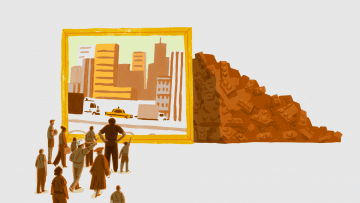Amanda Mull in The Atlantic:
 Once people are let out into the world to rejoin their lives, the pandemic will continue to harm them for years to come. “Epidemics are really bad for economies,” says Elena Conis, a historian of medicine and public health at UC Berkeley, laughing slightly at the understatement. “We’re going to see a whole bunch of college graduates and people finishing graduate programs this summer who are going to really struggle to find work.” If you’re willing to risk your life to mop hospital floors or fetch abandoned carts in grocery-store parking lots, a paycheck, however meager, is certainly in your future.
Once people are let out into the world to rejoin their lives, the pandemic will continue to harm them for years to come. “Epidemics are really bad for economies,” says Elena Conis, a historian of medicine and public health at UC Berkeley, laughing slightly at the understatement. “We’re going to see a whole bunch of college graduates and people finishing graduate programs this summer who are going to really struggle to find work.” If you’re willing to risk your life to mop hospital floors or fetch abandoned carts in grocery-store parking lots, a paycheck, however meager, is certainly in your future.
For Americans who either can’t do those jobs or aren’t desperate enough to try them, little relief is coming, relative to what other rich nations are doing for their populations. In Denmark, the government is paying up to 90 percent of employees’ salaries to keep businesses afloat and ensure that people have jobs when the pandemic ends. In the United Kingdom, the government will cover up to 80 percent of workers’ wages. In the United States, onetime relief checks of up to $1,200 per person are coming in the months ahead for people who had certain income and tax statuses in previous years, as well as expanded unemployment insurance for those who have lost work. But that’s only if you can successfully navigate the glutted, byzantine systems required to sign up for unemployment benefits. No one seems to know how the protections for gig workers are supposed to function or how small-business owners should obtain the loans they were promised. In the meantime, rent is still due.
These economic conditions are dangerous for nearly all Americans, but older people are more likely to have stable professional lives and finances to help cushion the blow. People just starting out now, and those who will begin their adult lives in the years following the pandemic, will be asked to walk a financial tightrope with no practice and, for most, no safety net.
More here.
